
Additional Information
Book Details
Abstract
Behavioral finance is the study of how psychology affects financial decision making and financial markets. It is increasingly becoming the common way of understanding investor behavior and stock market activity. Incorporating the latest research and theory, Shefrin offers both a strong theory and efficient empirical tools that address derivatives, fixed income securities, mean-variance efficient portfolios, and the market portfolio. The book provides a series of examples to illustrate the theory.
- The second edition continues the tradition of the first edition by being the one and only book to focus completely on how behavioral finance principles affect asset pricing, now with its theory deepened and enriched by a plethora of research since the first edition
"A mathematical-economist-turned-behavioral-economist, Hersh Shefrin challenges and delights the reader by applying concepts of behavioral economics with emphasis on investor heterogeneity to revisit a broad spectrum of topics in finance including portfolio management, trading, and the pricing of equities, bonds and options."
George M. Constantinides, Leo Melamed Professor of Finance, The University of Chicago Graduate School of Business
"The flood of empirical asset pricing research in recent years has often required financial economists to choose between two unpalatable options: either embrace the rich range of evidence with a somewhat atheoretical view; or, simply ignore that large portion of the evidence that conflicts with classical asset pricing theory. The behavioral finance pioneer Hersh Shefrin, in this new edition of his treatise, shows that one need not choose between theory and data. He shows that a number of seemingly "behavioral" patterns in the data can in fact be derived from a suitably modified version of the stochastic discount factor framework. Impressive in both scope and attention to detail, this book will be valuable for researchers, teachers, students, and investment professionals."
Jeffrey Wurgler, Research Professor of Finance, NYU Stern School of Business
Praise for the First Edition:
"This book will make the theory of behavioral finance far more useful and broadly applicable."
Bob Shiller, Cowles Foundation for Research in Economics, International Center for Finance, Yale University
